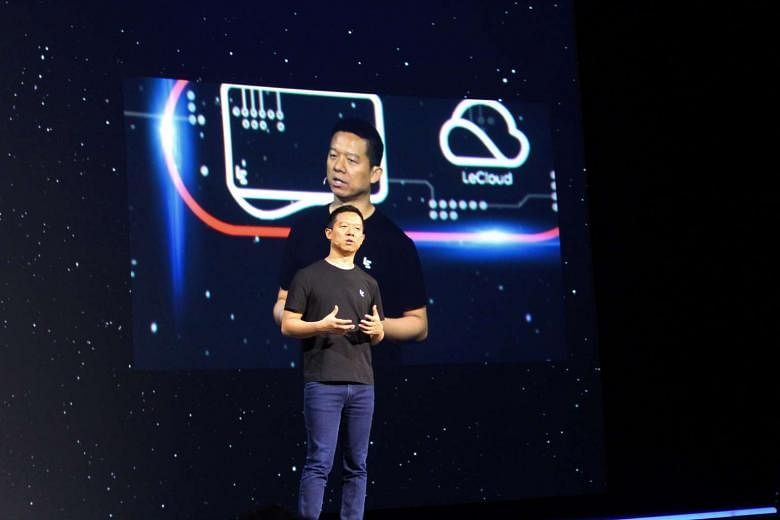HONG KONG (BLOOMBERG) - The billionaire chairman of China's LeEco has admitted his technology empire is running out of cash to sustain a headlong rush into businesses from electric cars to smartphones.
In a lengthy letter to employees, company co-founder Jia Yueting apologised to shareholders and pledged to slash his income to one yuan (21 Singapore cents), slow LeEco's madcap pace of expansion, and move the company towards a more moderate phase of growth.
LeEco is the umbrella holding company for a sprawling family of businesses that includes sports media, automobiles, smartphones and TVs. The company known for its LeTV streaming service has aggressively pursued funding and placed bets on new ventures, from an electric car plant in Nevada to a US$2 billion (S$2.78 billion) acquisition of California TV maker Vizio Inc.
"No company has had such an experience, a simultaneous time in ice and fire," Mr Jia wrote in a letter, obtained by Bloomberg News, describing LeEco's rise and subsequent issues. "We blindly sped ahead, and our cash demand ballooned. We got over-extended in our global strategy. At the same time, our capital and resources were in fact limited."
Analysts have begun to question LeEco's longer-term prospects, given the opacity surrounding investments by its various subsidiaries and a reliance on equity-backed loans. Shares in Leshi Internet Information & Technology Corp and Coolpad Group Ltd, the two listed companies Mr Jia chairs, were little changed after Monday's sell-off. Coolpad, which assembles LeEco's phones alongside its own brand, dived almost 18 per cent on Monday to its lowest in more than three years. Leshi was up less than 1 per cent after marking a one-year trough on Monday.
"The company spread itself too quickly. They have a big ambition to create an ecosystem for different devices, not only for phones and TVs and set-top boxes but for vehicles," said Gartner Inc research director Sandy Shen. "They have a big ambition that is too big to swallow at this moment."
Mr Jia's memo circulated widely on social media on Monday and prompted a testy exchange with rival smartphone maker Xiaomi Corp. Xiaomi co-founder Lei Jun called attention to the opacity surrounding LeEco's outstanding debt, according to a screengrab of his WeChat message account that LeEco posted. That prompted a sharp riposte from Mr Jia's company, which blasted Xiaomi and Mr Lei for spreading rumours. An hour later, one of Xiaomi's official Weibo accounts fired back, asking Mr Jia to focus on LeEco's debt rather than distract the public.
A self-made billionaire who got his start working in IT at a local tax bureau, Mr Jia founded Leshi Internet Information & Technology in 2004, one of the first companies in China to stream TV shows and movies to paying subscribers. He entered the smart TV businesses in 2013 and the smartphone market in 2015.
But his growing empire relies on a risky financing model. Leshi is publicly listed on the Shenzhen Stock Exchange and the only profitable entity, according to Winston Cheng, LeEco's head of corporate finance. Mr Jia has borrowed against his shares in Leshi for cash that he invested into his other companies, regulatory filings show.
That practice has invited scrutiny in the US, where Mr Jia is trying to get electric car-making venture Faraday Future off the ground. Nevada Treasurer Dan Schwartz has balked at issuing bonds needed to get the project up, citing doubts about Mr Jia's ability to raise funds. The treasurer's office wasn't immediately available for comment outside of normal business hours.
Leshi's stock has plummeted by almost a third since the start of 2016. Mr Jia has showed off an electronic concept car dubbed the LeSee, and in September raised more than US$1 billion from a consortium of Chinese investors to make it. But in his memo on Monday, Mr Jia singled out the car division for its profligacy, saying it had already spent 10 billion yuan in early development.
"Our fund-raising ability isn't strong," Mr Jia wrote. "The scale of our external fund raising had trouble satisfying the demands of our rapid expansion."

